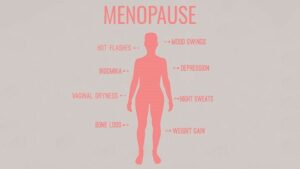The symptoms of menopause depression can be difficult to deal with. Mood swings, fatigue, and irritability are just a few of the challenges that women face during this time. If you are experiencing these symptoms, don’t worry – you are not alone. In this blog post, we will discuss ways to deal with menopause depression and improve your quality of life.
Contents
What Is Menopause Depression?
 It’s normal to feel some anxiety and sadness during menopause. After all, your body is going through a lot of changes. But for some women, these feelings are more intense and last longer, eventually turning into depression. Menopause depression can make you feel hopeless, exhausted, and irritable.
It’s normal to feel some anxiety and sadness during menopause. After all, your body is going through a lot of changes. But for some women, these feelings are more intense and last longer, eventually turning into depression. Menopause depression can make you feel hopeless, exhausted, and irritable.
Depression is itself a complex condition, and there are many possible causes of menopause depression. Hormonal changes during menopause can play a role. So can psychological factors like stress or grief. It is believed that a combination of genetic, biological, and social factors may contribute to the development of depression.
Menopause depression is different from the “baby blues,” which are common after childbirth. The baby blues usually go away within a couple of weeks. Menopause depression can last for months or even years. Therefore, it is not something that you can always manage but sometimes you need help from a professional.
If you think you may be suffering from menopause depression, it’s important to see your doctor. He or she can rule out other possible causes of your symptoms and give you an official diagnosis. Once you have a diagnosis, you and your doctor can develop a treatment plan.
How Does Menopause Depression Feel Like?
The feeling of menopause depression is different for every woman. Some common symptoms include:
- Feeling sad or blue most of the time
- Losing interest in activities that used to be enjoyable
- Having difficulty sleeping or sleeping too much
- Feeling tired all the time
- Having trouble concentrating or making decisions
- Experiencing changes in appetite or weight
- Feeling hopeless or worthless
- Having physical symptoms such as headaches or stomachaches that don’t go away with treatment
These are the most common symptoms of this condition, however, there are also some other signs that you should be aware of. If you are experiencing any of the following, it’s important to reach out to your doctor or mental health professional.
- Suicidal thoughts or behaviors
- Self-harm
- Withdrawing from friends and family
- Not being able to perform usual activities
- Drastic changes in eating or sleeping habits
- Increased use of alcohol or drugs
- Anxiety
- Feeling overwhelmed or out of control
- Panic attacks
- Vaginal dryness
Overall, this is how menopause depression can manifest itself. If you are worried that you may be suffering from this, it’s important to reach out to your doctor or mental health professional. With the right support, you can get through this tough time.
Is Depression a Symptom Of Menopause?
 It is possible that the hormonal changes associated with menopause may contribute to depression. In addition, the physical symptoms of menopause, such as hot flashes and sleep problems, can also cause or worsen depression. However, not all women who experience menopause will have depression.
It is possible that the hormonal changes associated with menopause may contribute to depression. In addition, the physical symptoms of menopause, such as hot flashes and sleep problems, can also cause or worsen depression. However, not all women who experience menopause will have depression.
As menopause cause you to experience a wide range of emotions, you may feel like you’re on an emotional roller coaster. One minute you may feel fine and the next minute you may feel angry, sad, or anxious. These mood swings can be caused by the hormonal changes associated with menopause.
And with these emotions and feelings, depression can come along with it. Depression is more than just feeling blue or sad. It’s a real medical condition that causes you to feel hopeless, lose interest in activities you once enjoyed, and have little energy. Depression can make it hard to function at work and at home.
However, it is not always easy to tell if the symptoms you’re experiencing are due to menopause or depression. If you’re having trouble functioning in your everyday life, it’s important to see your doctor or mental health professional. They can help you figure out if what you’re experiencing is menopause-related depression or something else.
What Triggers Depression In Menopause?
Now that we understand if menopause can cause depression then let’s look at what triggers depression in menopause. These include:
- Hormonal changes: It’s no secret that hormones play a vital role in our mood. So, it’s no surprise that the drastic hormonal changes during menopause can lead to depression.
- Lifestyle changes: Many women experience lifestyle changes during menopause such as retirement, children leaving home, or the death of a loved one. These types of significant life changes can lead to depression.
- Sleep problems: Sleep problems are common during menopause and can trigger or worsen depression.
- Medical conditions: Some medical conditions can cause or contribute to depression such as thyroid problems, heart disease, and diabetes.
- Genetics: If you have a family history of depression, you may be more likely to experience it yourself.
These are the most possible triggers of depression in menopause. Along with these, there are a few risk factors that can increase your chances of developing depression during menopause. These include:
- A history of depression: If you’ve experienced depression in the past, you’re more likely to experience it again.
- Stressful life events: Stressful life events such as divorce or job loss can trigger depression.
- Lack of social support: If you don’t have a strong network of family and friends, you may be more likely to experience depression.
- Brain structure: This is a controversial one, but some research suggests that certain brain structures may be linked to depression.
As you can see, there are numerous possible causes of depression during menopause. If you’re experiencing depression, it’s important to talk to your doctor so they can help you identify the cause and find the best treatment for you.
How Long Does It Last?
 Menopause depression is believed to last for an average of four years. However, some women may experience menopause depression for a shorter period of time, while others may suffer from menopause depression for a longer period of time. There is no one-size-fits-all answer to this question.
Menopause depression is believed to last for an average of four years. However, some women may experience menopause depression for a shorter period of time, while others may suffer from menopause depression for a longer period of time. There is no one-size-fits-all answer to this question.
It is a question that can be answered only in consultation with a mental health professional. As they can provide you with a more accurate diagnosis and discuss treatment options with you.
But studies have found that women who have a history of depression may have long-lasting menopause depression. Because of this, it’s important to be proactive about your mental health during this time. With the right intervention and support, you can get through this tough time.
How Does it Impact life?
It is not uncommon for women who are experiencing menopause depression to have negative consequences in their daily life. Some negative impacts are as follows:
- Less productivity: This can come about as a result of having difficulty concentrating or focusing on tasks.
- Increased irritability: Many women find that they are quicker to anger and experience more mood swings.
- Relationship problems: Hormonal changes can lead to tension and conflict with friends, family, and romantic partners.
- Sleep problems: Insomnia or disturbed sleep is a common symptom of menopause depression.
- Weight gain: Some women find that they gain weight during menopause because they are less active and have a decrease in metabolism.
- Low self-esteem: With menopause depression often comes a negative body image and feelings of worthlessness.
- Negative thoughts about the body: It is not uncommon for women to have negative thoughts about their bodies during menopause depression. This can include feelings of disgust or shame.
These are some common consequences that a woman experiences with menopause depression. It is important to remember that every woman is different and will experience menopause depression in her own way. If you are experiencing any of these symptoms, it is important to talk to your doctor. There are many treatment options available and with the help of a professional, you can find relief from your symptoms.
How Can You Treat Menopause Depression?
 There are a number of ways that you can treat menopause depression. Some women may need medication to get through this tough time, while others may just need a little extra support. Here are some things you can do to ease your menopause depression:
There are a number of ways that you can treat menopause depression. Some women may need medication to get through this tough time, while others may just need a little extra support. Here are some things you can do to ease your menopause depression:
- Talk to your doctor: This is the most important thing you can do if you think you are suffering from menopause depression. Your doctor will be able to help you figure out what is going on and how to best treat it.
- Exercise: Exercise has been shown to be one of the most effective treatments for depression, so it is definitely worth a try. Even a simple walk around the block can make a big difference.
- Eat a healthy diet: What you put into your body can have a big impact on your mood. Eating plenty of fruits, vegetables, and whole grains will help keep your energy levels up and your mood stable.
- Talk to someone: Sometimes just talking to someone who understands what you’re going through can be a big help. If you don’t have anyone in your life who can relate, there are many online forums and support groups that can be great resources.
- Get enough sleep: Sleep is essential for good mental health, so make sure you are getting enough rest. This may mean going to bed a little earlier or taking a nap during the day.
- Try relaxation techniques: Things like yoga, meditation, and deep breathing can help ease stress and anxiety, which can contribute to this type of depression. It is believed to work by slowing down the activity of the sympathetic nervous system, which is responsible for the “fight or flight” response.
- Consider herbal remedies: Some herbs, such as black cohosh and St. John’s wort, have been shown to be effective in treating menopause symptoms. However, it is important to talk to your doctor before taking any supplements, as they can interact with other medications you may be taking.
Making lifestyle changes is often the first line of defense against menopause depression. However, if these measures don’t seem to be helping, don’t hesitate to talk to your doctor about other treatment options. Menopause is a difficult time for many women, but there is no reason to suffer through it alone.
With the right support, you can get through this and come out to the other side feeling like yourself again. Making even a small effort to improve your mood can make a big difference. Just remember that you are not alone and there are people who care about you.
Conclusion
To wrap, menopause depression is though not an easy phase to go. But, if we know how to deal with it carefully, everything will be just fine. Be patient and do not put too much pressure on yourself. Do not forget that you are not alone in this journey. There are a lot of other women who are experiencing the same thing.
Seek professional help if necessary and do not hesitate to talk to your loved ones about what you are going through. Do not be afraid to ask for help when you need it. Remember, menopause is just a phase and it will eventually end.
For more information and guidance please get in touch with our expert therapists at Therapy Mantra. They will be more than happy to assist you on your journey to recovery. Contact us today to learn more about our services. You can also book an online therapy session or download our free Android or iOS app.


